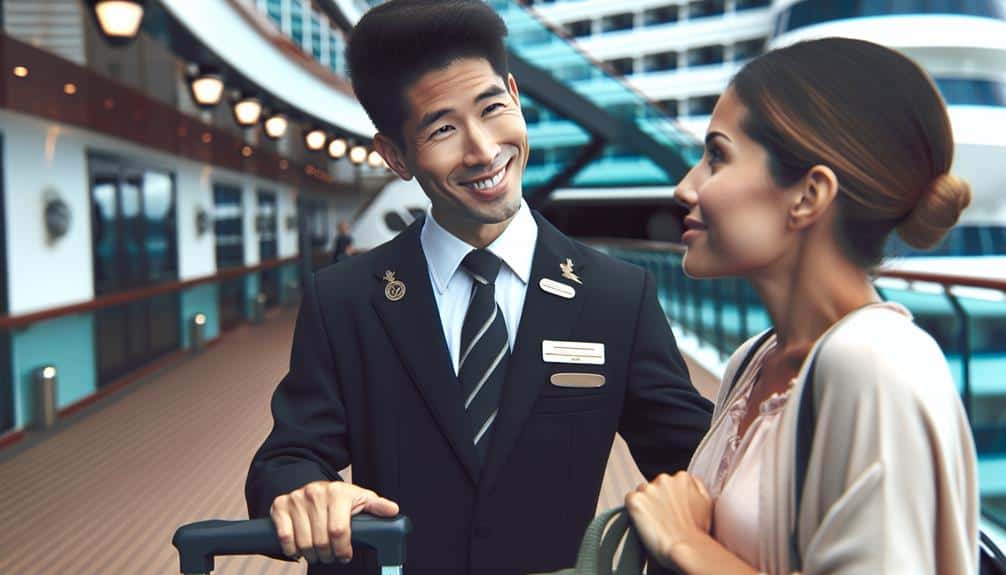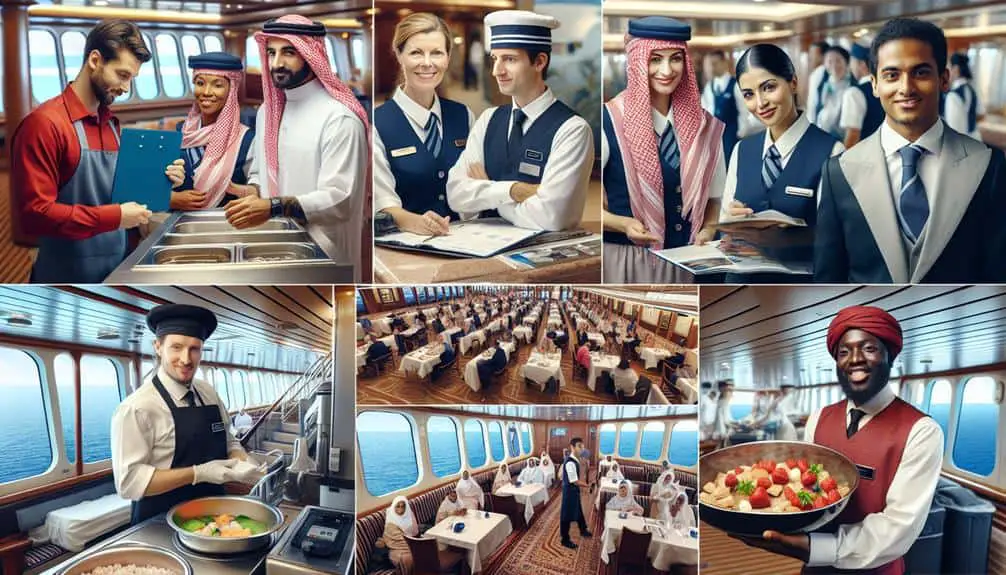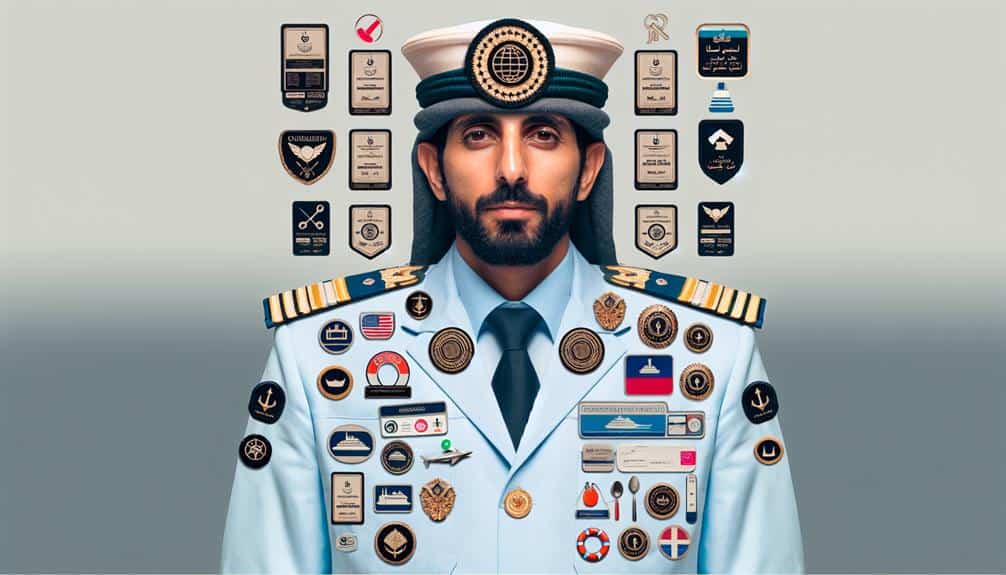To master customer service skills for cruise staff, understand customer needs by listening actively and using empathy. Utilize surveys and adapt to preferences. Observe verbal and non-verbal cues, practice active listening, and respect cultural differences. Solve problems effectively by addressing root issues, thinking creatively, and collaborating. Build rapport by personalizing interactions, being culturally aware, and maintaining a positive attitude. Handle difficult situations with empathy, de-escalation, and staying composed. Developing these skills will help you excel in providing exceptional service onboard.
Key Points
- Utilize empathy training to understand customer needs.
- Practice active listening to effectively communicate with passengers.
- Employ effective problem-solving techniques to address issues.
- Build rapport by personalizing interactions and maintaining a positive attitude.
- Demonstrate empathy and use de-escalation techniques in difficult situations.
Understanding Customer Needs
Understanding customer needs begins with actively listening to their concerns and preferences onboard the cruise ship. Empathy training plays an important role in honing this skill. By putting yourself in the shoes of the passengers, you can better grasp their expectations and deliver exceptional service tailored to their desires. Customer satisfaction surveys are valuable tools that provide insights into the needs and experiences of passengers. Analyzing these surveys helps in identifying trends, areas for improvement, and overall satisfaction levels.
During interactions with customers, pay close attention to verbal and non-verbal cues. These cues offer valuable information about their needs and emotions. By being attentive and empathetic, you can create a welcoming and personalized experience for each passenger. Remember, every individual is unique, and their preferences may vary. Your ability to adapt and cater to these differences will greatly enhance customer satisfaction and loyalty.
Continuously seeking feedback and actively listening to customers won't only meet their needs but exceed their expectations, setting a high standard for customer service onboard the cruise ship.
Communication Strategies for Crew
To enhance communication among the crew members, keen observation of both verbal and non-verbal cues is essential for fostering a cohesive and efficient working environment onboard the cruise ship. Active listening plays a vital role in understanding your fellow crew members and resolving conflicts effectively. Cultural sensitivity is paramount to guarantee respectful and harmonious interactions with colleagues from diverse backgrounds.
Here are some strategies to improve communication among the crew:
- Practice active listening during conversations to demonstrate attentiveness and understanding.
- Be mindful of non-verbal cues such as body language and facial expressions to grasp the full message being communicated.
- Respect cultural differences by taking the time to learn about and appreciate the customs and traditions of your colleagues.
- Encourage open communication by creating a safe space for team members to express their thoughts and concerns.
- Provide feedback constructively and positively to foster continuous improvement and mutual respect within the crew.
Problem-Solving Techniques
When faced with challenges onboard the cruise ship, employing effective problem-solving techniques is essential to guarantee smooth operations and guest satisfaction. Vital listening plays a critical role in understanding the issue at hand. When a guest approaches you with a complaint or problem, give them your full attention. This not only shows respect but also allows you to grasp the root of the issue accurately.
To provide the best service, think outside the box and come up with creative solutions. Sometimes a standard approach mightn't suffice, and that's where innovation is key. Engage with your team to brainstorm ideas and find unique ways to address the problem at hand. By fostering a collaborative environment, you can pool together different perspectives and expertise to arrive at the most effective solutions.
Building Rapport With Passengers
Listen attentively to passengers' needs and interests to establish genuine connections and enhance their onboard experience. Building rapport with passengers is essential for providing exceptional customer service on a cruise. Here are five key strategies to help you master this skill:
- Personalized Interactions: Tailor your interactions to the individual passenger to make them feel valued and special.
- Cultural Awareness: Respect and appreciate the diverse backgrounds of passengers to create a welcoming environment for everyone onboard.
- Building Trust: Be reliable, honest, and transparent in your interactions to foster trust and loyalty with passengers.
- Positive Attitude: Maintain a friendly and positive demeanor at all times, even in challenging situations, to uplift passengers' moods.
- Active Listening: Pay close attention to what passengers are saying and respond thoughtfully to show that you genuinely care about their experience.
Handling Difficult Situations
During challenging moments on a cruise, demonstrating empathy and problem-solving skills is essential in effectively handling difficult situations. When faced with irate passengers or tense conflicts, employing de-escalation techniques can help diffuse the situation. Start by actively listening to the passenger's concerns, acknowledging their feelings, and showing understanding. This empathetic approach can often calm them down and make them more receptive to finding a resolution.
Conflict resolution strategies play an important role in steering through challenging scenarios onboard. It's important to remain calm and composed while addressing the issue at hand. Encourage open communication, allowing passengers to express themselves fully while you maintain a professional demeanor. By actively involving them in the problem-solving process, you can work together towards a mutually beneficial solution. Remember, the goal is to resolve the conflict peacefully and make sure that the passenger feels heard and valued throughout the interaction. By mastering these techniques, you can effectively handle difficult situations and maintain a positive cruise experience for all passengers.
Frequently Asked Questions
How Can Cruise Staff Effectively Manage Their Time and Prioritize Tasks to Ensure Excellent Customer Service?
To effectively manage your time and prioritize tasks for outstanding customer service, start by creating a daily timetable, setting clear goals, and using tools like task lists. Regularly reassess priorities to adapt to changing demands and guarantee excellent service.
What Are Some Ways for Cruise Staff to Handle Cultural Differences and Language Barriers When Interacting With Passengers?
Traversing diverse cultures at sea can be a challenge. Embrace cross-cultural communication with empathy and adaptability. Take advantage of diversity training to enhance intercultural awareness. Break language barriers by using simple, clear communication strategies.
How Can Cruise Staff Ensure They Are Providing Personalized Service to Each Passenger on a Busy Ship?
To guarantee personalized communication on a busy ship, prioritize active listening, empathy, and anticipating needs. Use time management skills to dedicate moments for each passenger. Engage genuinely, remember details, and make each interaction memorable.
What Are Some Tips for Cruise Staff to Maintain a Positive Attitude and Energy Throughout Long Shifts?
Feeling drained during long shifts? Remember, energy management is key. Find balance in work and life. Cultivate a positive mindset to combat stress. You've got this! Stay focused, stay positive, and take care of yourself.
How Can Cruise Staff Handle Situations Where Passengers May Be Under the Influence of Alcohol or Drugs While Still Providing Exceptional Customer Service?
When passengers are under the influence, de-escalate any aggression calmly. Prioritize safety concerns while upholding exceptional service standards. Communicate clearly, offer assistance, and involve security if necessary. Your professionalism in handling these situations guarantees a safe and positive cruise experience.




